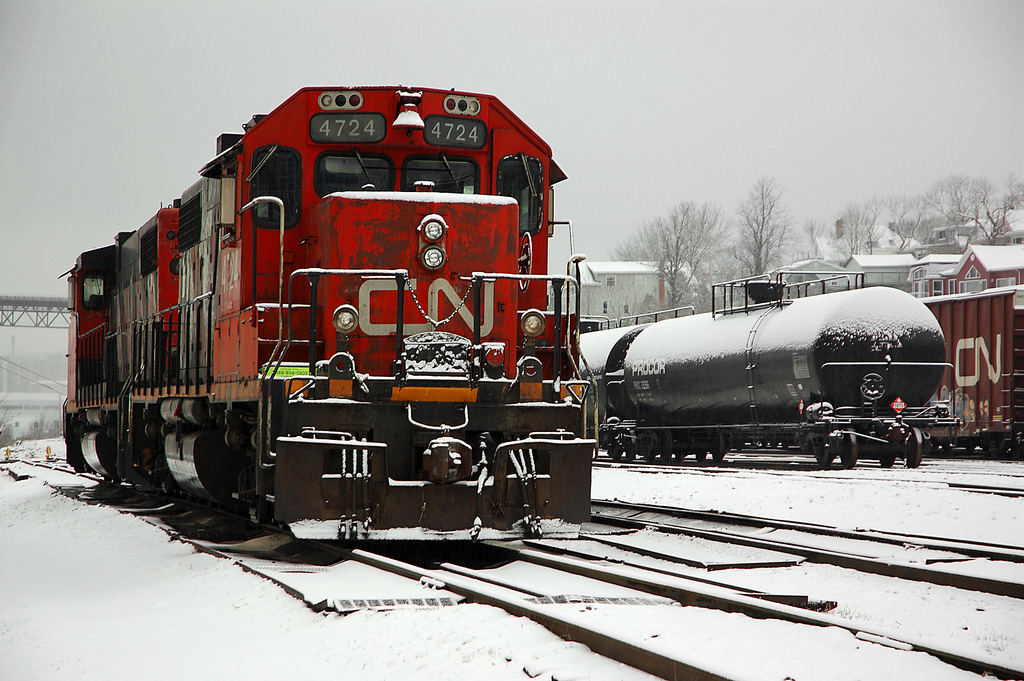Like this article? Chip in to keep stories likes these coming.
The country is big and the struggles are diverse! Not knowing what’s happening — what could be worse?
How better to capture the goings-on in the Canadian labour movement than with a handy links round-up. In no particular order, here’s a quick rundown of some of the labour movement news across Canada:
- In a historic Supreme Court of Canada ruling last week, 5-2 judges voted down Saskatchewan’s essential service law, arguing that such laws were an infringement upon worker’s Charter right to free association. Now Saskatchewan Premier Brad Wall says he is willing to use the Charter’s notwithstanding clause to continue to prohibit some public-sector employees from striking. Of course, we wrote about it here.
- Contract negotiations between Teamsters and CP Rail are ongoing. Members of the Teamsters Canada Rail Conference have voted 93 per cent in favour of taking strike action in order to obtain a negotiated settlement with Canadian Pacific Railway. A strike or lockout is possible as early as February 15. A strike would potentially test the reach of last week’s Supreme Court decision on workers’ right to strike and essential service laws. The federal government has, in the past, intervened in rail worker labour disputes. According to the CBC, the federal government was prepared to intervene and force CN workers back to work during 2014 contract negations, as they had done with CP rail workers in 2012. (Note:corrected post)
- Members of the Ontario Nurses’ Association (ONA) have been on strike since January 30 over wages and workloads. Approximately 3,000 of Community Care Access Centre health professionals continued to walk the picket lines this week demanding wage increases similar to those awarded to the province’s 57,000 registered nurses working in hospitals, long-term care and public health. The CCAC health professionals had a two-year wage freeze in their last contract, which expired in March, 2014. Their employers were offering them another one-year wage freeze in the new contract.
- Members of CUPE 3903, which represents the contract faculty, teaching assistants, graduate assistants, and research assistants at York University, has voted almost 80 per cent in favour of a strike mandate. Over 40 per cent of the union’s 3,700 members cast ballots, the largest turnout in ten years. Under the banner, “A Better York is Possible,” the union is asking the administration to promote access and equity by abolishing differential tuition fees for international graduate students, provide contract faculty and graduate students with paths to more stable employment, and improve teaching conditions.
- On another Toronto Campus, CUPE 3902 members are also in a strike position. Two units within the five-part composite local at the University of Toronto have voted over 90 per cent in favour of giving their bargaining committee a mandate to take any and all actions necessary if they cannot achieve a collective agreement through negotiations. Over 2,000 sessional lecturers, writing instructors, teaching assistants, and course instructors have expressed their willingness to take job action.
- Municipal workers in Happy Valley Goose Bay are in their fourth week of a lock-out. With temperatures below -20 C and more snow than usual, roads are being poorly maintained by a skeleton crew of workers who have remained on the job to fulfill essential service requirements. Though the issue of two-tiered pensions is off the table, the union rejected the Town’s most recent offer due to wage concerns.
- In two weeks, the 13 pressroom employees at Nova Scotia newspaper, the ChronicleHerald, will be in a strike or lock-out position. Earlier this winter, the paper reduced its newsroom staff by almost one third, now the Herald’s owners are calling for wage freezes, an end to early retirement incentives, the removal of job protection language, and the right to change negotiated shifts, reports the Halifax Media Co-op.
- OPSEU, which represents 35,000 Ontario Public Service workers says that the provincial government is forcing OPSEU members out on strike. “Our teams made it clear at the bargaining table that we would not accept the massive contract concessions the employer was demanding,” said OPSEU President Smokey Thomas in a press release, “However, we also made it clear we were there to negotiate an agreement, not a strike. The government has completely ignored our position, and has now started the process that will ultimately result in a province-wide labour disruption.” The current collective agreement for all OPS employees expired Dec. 31, 2014.
Ella Bedard is rabble.ca’s labour intern. She has written about labour issues for Dominion.ca and the Halifax Media Co-op and is the co-producer of the radio documentary The Amelie: Canadian Refugee Policy and the Story of the 1987 Boat People.
Editor’s note: An earlier version of this article which stated that a settlement had been reached between the Teamsters and CP. In fact, negotiations are ongoing. rabble.ca regrets the error.
Like this article? Chip in to keep stories likes these coming.



